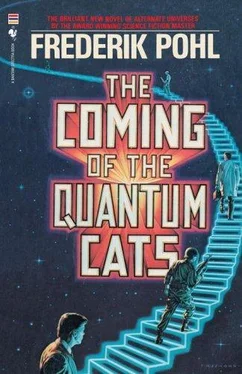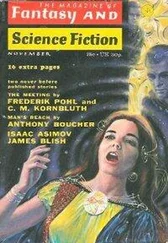Frederik Pohl - The Coming of the Quantum Cats
Здесь есть возможность читать онлайн «Frederik Pohl - The Coming of the Quantum Cats» весь текст электронной книги совершенно бесплатно (целиком полную версию без сокращений). В некоторых случаях можно слушать аудио, скачать через торрент в формате fb2 и присутствует краткое содержание. Год выпуска: 1986, ISBN: 1986, Издательство: Bantam Books, Жанр: Фантастика и фэнтези, на английском языке. Описание произведения, (предисловие) а так же отзывы посетителей доступны на портале библиотеки ЛибКат.
- Название:The Coming of the Quantum Cats
- Автор:
- Издательство:Bantam Books
- Жанр:
- Год:1986
- ISBN:9780553763393
- Рейтинг книги:5 / 5. Голосов: 1
-
Избранное:Добавить в избранное
- Отзывы:
-
Ваша оценка:
- 100
- 1
- 2
- 3
- 4
- 5
The Coming of the Quantum Cats: краткое содержание, описание и аннотация
Предлагаем к чтению аннотацию, описание, краткое содержание или предисловие (зависит от того, что написал сам автор книги «The Coming of the Quantum Cats»). Если вы не нашли необходимую информацию о книге — напишите в комментариях, мы постараемся отыскать её.
The Coming of the Quantum Cats — читать онлайн бесплатно полную книгу (весь текст) целиком
Ниже представлен текст книги, разбитый по страницам. Система сохранения места последней прочитанной страницы, позволяет с удобством читать онлайн бесплатно книгу «The Coming of the Quantum Cats», без необходимости каждый раз заново искать на чём Вы остановились. Поставьте закладку, и сможете в любой момент перейти на страницу, на которой закончили чтение.
Интервал:
Закладка:
"Oranges!" he said.
"We can't deliver much quantity, I'm afraid," I said, "because it'll be a while before the groves are really producing again. Can we get out of the rain while we talk?"
We didn't quite make it on the first try, because one of the airtraffic people stopped me to ask if I'd seen any signs of ballistic recoil on the way from California. He looked pleased when I told him I hadn't, less pleased when I explained that I'd been asleep about half the time and busy with paperwork most of the rest. Still, he was content to tell me that nobody had experienced much of it in the last month or so; evidently the resonances were damping down on schedule.
So then we were allowed to go into Herby's office, a brightly lit, messy cubicle in one of the bubble structures in the park. We haggled over prices for half an hour. I took my wet shoes off and let my socks dry while we talked. He had some real coffee and gave me a cup, and I wondered if we could grow the stuff. Decided against it. People from the consort had already gone exploring down into Baja and other parts of Mexico. Someday we might want to hive off a colony to grow coffee and maybe bananas and papaya there, but they were too far from Palm Springs to be good ideas right now. Anyway, I had plans enough for the next year. "We'll have fresh spinach and grapes for you in about a month," I told Herby, "and Crenshaw melons around Christmas. We're short of labor, though. Do you know if there are likely to be any real farm workers coming through?"
"Nobody's coming through any more," he said absently, thinking about Crenshaw melons for Christmas. "They've closed all the portals, except for a couple of signal-only peeping stations. You might pick up some workers anyway; there's still a few hundred physicists and soldiers and so on waiting for assignment in the hotels."
I sighed. Retraining physicists and soldiers already took a lot of time away from trying to revive old orchards and planting new crops. "If you've got twenty volunteers," I said, "we can take them back tonight. Families would be best. Or single women?"
He laughed. I expected him to; that was a joke. When we'd finished haggling over prices and contracts for future delivery, he poured another cup of coffee for us both and leaned back, gazing at me. "Dominic?" he said. "How would you like to come back and work for me in procuring?"
"No, thanks."
He persisted. "You'd have a hell of a lot better job. I'd match anything they pay, and you'd be in the city. We've got power and water in half the West Side now. It's going to be really nice here."
"After you get it cleaned up," I said, grinning.
"Sure! It's happening. Five years from now—"
"Five years from now," I told him, "we'll be cleaning up San
Diego. Now, there's a pretty place for a city! Not to mention the climate."
He said thoughtfully, "You know, I wouldn't mind living in California sometime, after we get things straightened out around here. I've been thinking about Los Angeles—"
"Los Angeles! Who would want to revive Los Angeles?" I looked at my watch. "Nice talking to you, Herby, but my return flight's not going to wait for me and I've got some things I want to do here. Any chance of borrowing a pair of dry shoes somewhere? And maybe a raincoat?"
The lobby of the Plaza was cleaner than I'd left it, and emptier. Something like twenty-two thousand Peety-Deepies had come through the New York City relocation centers. Only about two hundred were left in the Plaza, and some of the other hotels had already been closed down, mothballed, pending some time in the future when they would be needed again for people who came in planes or cars instead of portals.
I didn't linger. My first business was with the transient desk, where they let me borrow a terminal long enough to type in a name and get an address. I asked the man at the counter how to get to Riverside Drive, found out I could pick up a taxi in front of the hotel, and only then realized I didn't have any money to pay a taxi fare. Or anything else. "Can I pay with my California money card?" I asked, and he tried not to laugh.
"You'll need cash," he told me. "Out in the lobby there's a cash dispenser. If you've got your card, it'll probably take care of you."
It did. It took the help of two bystanders for me to figure out how to make it work, but then it spat out twenty-four sixteen-dollar bills, h-chew, k-chew, k-chew, and I scuttled away. Hick in the big town! Some things didn't change.
In the taxi I turned the money over curiously. It was really a nuisance to use cards for little things, or even for such bigger things as dealing with the independent communities in Palo Alto and Santa Barbara or playing poker on Saturday nights. They were interesting colors: greeny-gold and black on one side, gold and scarlet on the other. The numbers were in binary, of course, and they weren't made out of the kind of banknote paper I'd seen all my life—all my other life-but of something that had a feel almost like silk, and, I discovered when I risked a corner of one, was distinctly harder than paper to tear. Altogether it was neat-looking money. The picture of
Andrew Jackson on one side and the White House on the other weren't steel engravings but holograms. As I turned the bills in my hands the perspective shifted slightly, and halos of other colors appeared around the pictures, red, white, and blue behind Jackson, a full-spectrum rainbow over the White House. The name of the printer was on the notes, an outfit in Philadelphia—first I knew anything was going on in Philadelphia—and I made a note, as best I could while the taxi jolted up the potholes and cracked cement of Broadway. Next council meeting I would take up the question of whether we wanted to print some of these for ourselves.
Then we were at Riverside Drive; I paid off the taxi driver and looked around. The Hudson ran clear and sweet. There were big trees growing over on the cliffs at the jersey side, and I couldn't see the George Washington Bridge—hadn't been built yet, I supposed, when all building stopped. But the apartment house I was going to was in good shape. There was glass in the windows. The hail floors were clean tile. And while I was climbing the stairs to the sixth floor I heard the whir of motors and realized that the climb wasn't necessary—they'd even got the elevators running. And when I got to apartment 6-C and knocked on the door it opened right away, only the person who looked out at me wasn't who I expected at all. It was the senator. "Nicky!" he cried. "Hey, Nyla! It's Nicky DeSota. Come and say hello!"
Then she appeared, looking pretty and happy and very much like the person I was looking for—as much as I looked like the senator—almost as much, because there was that very visible difference when she shook my hand. And nothing would do but that I come in, and have some more of that real coffee and talk for a while about what I was doing and what they were doing and how, really, we were pretty well off where we were, the worlds we'd left behind be darned.
It was a pity she was the wrong Nyla.
But they were able to tell me where the right one was, and twenty minutes later I was on my way. To the old Metropolitan Museum of Art. No more than two minutes from where I'd landed in the blimp in the first place.
The senator and his Nyla had been surprised to see me. The Nyla without thumbs was more than that. She was flabbergasted, and a little suspicious. "All that stuff back home," she said at once, "is over. If you're sore, you're sore, and I wouldn't blame you. But I'm not apologizing, either."
"I'm not sore," I said. "I just want to take you to dinner—. maybe across the park, in that restaurant with the trees around it."
"I can't afford that!"
"I can," I said. "Mind if we walk? I'd like to keep an eye on how they're loading the blimp."
Читать дальшеИнтервал:
Закладка:
Похожие книги на «The Coming of the Quantum Cats»
Представляем Вашему вниманию похожие книги на «The Coming of the Quantum Cats» списком для выбора. Мы отобрали схожую по названию и смыслу литературу в надежде предоставить читателям больше вариантов отыскать новые, интересные, ещё непрочитанные произведения.
Обсуждение, отзывы о книге «The Coming of the Quantum Cats» и просто собственные мнения читателей. Оставьте ваши комментарии, напишите, что Вы думаете о произведении, его смысле или главных героях. Укажите что конкретно понравилось, а что нет, и почему Вы так считаете.












